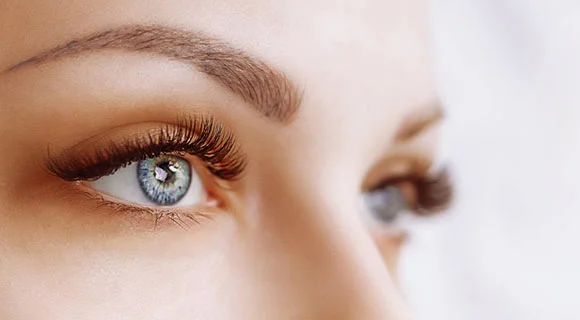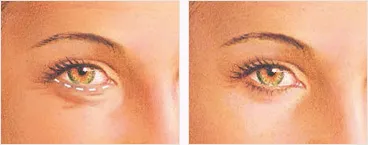Eyelid Surgery or Blepharoplasty in Birmingham AL
Upper and Lower Eyelid Rejuvenation with Plastic Surgery

Eyelid Surgery, or blepharoplasty, is a plastic surgery procedure to improve the appearance of the upper eyelids, lower eyelids or both. Whether you want to improve the appearance of your eyes or are experiencing functional problems with your eyelids, eyelid surgery can rejuvenate your face with a brighter look.
Eyelid surgery can treat:
- Loose or sagging skin that creates folds or disturbs the natural contour of the upper eyelids, sometimes impairing vision.
- Fatty deposits that appear as puffiness in the eyelids.
- Bags under the eyes.
- Drooping lower eyelids that reveal white below the iris.
- Excess skin and fine wrinkles of the lower eyelids.
Eyelid surgery has become one of the most popular procedures for facial rejuvenation at our Birmingham, Alabama cosmetic surgery center. The plastic surgeons at Hedden & Gunn Plastic Surgery can restore a more alert, youthful look by eliminating excess skin from the upper eyelids and reducing bagginess below the eyes. Contact us today to ask about scheduling your blepharoplasty consultation.
Eyelid Surgery Candidates
Good candidates for eyelid surgery include:
- Nonsmokers who are healthy and without medical conditions that can impair healing.
- People without serious eye conditions.
- People with a positive outlook and realistic goals.
The appearance of a drooping upper lid may also be due to relaxation of the forehead skin and eyebrow. Sometimes stretching out of the upper eyelid muscle may cause a drooping eyelid. This is called eyelid ptosis and requires a different surgical treatment.
Your plastic surgeon will evaluate your facial anatomy thoroughly and will discuss what procedures might best remedy your concerns.
Your Eyelid Surgery Consultation
During your eyelid surgery consultation, be prepared to discuss:
- Your surgical goals.
- Medical conditions, drug allergies, previous medical treatments and specifically any problems you have had with your eyes.
- Current prescription medications, including vitamins, herbal supplements, alcohol, tobacco and drug use.
- Previous surgeries.
Your eyelid surgery surgeon will also:
- Evaluate your general health status and any pre-existing health conditions or risk factors.
- Take photographs for your medical records.
- Discuss your eyelid surgery options.
- Recommend a course of treatment.
- Discuss likely outcomes of eyelid surgery and any potential risks.
- Discuss the type of anesthesia that will be used.
- Answer any questions you have about eyelid surgery.
Eyelid Surgery Risks and Safety
Each patient must decide if the benefits of eyelid surgery will achieve their goals, and if the risks and potential complications are acceptable. The risks of eyelid surgery include:
- Anesthesia risks.
- Bleeding from the incision lines.
- Changes in skin sensation or numbness of the eyelashes.
- Difficulty closing your eyes.
- Dryness to the eyes.
- Ectropion, an outward rolling of the lower eyelid.
- Infection.
- Lid lag, a pulling down of the lower eyelid, may occur and is often temporary.
- Pain, which may persist.
- Possible need for revision surgery.
- Sensitivity to sun or other bright light.
- Swelling and bruising.
- Temporary or even permanent change in vision, and very rare chance of blindness.
- Unfavorable scarring.
Eyelid surgery risks will be fully discussed prior to your consent. It's important that you address all of your concerns about risks with your plastic surgeon. You will be asked to sign consent forms to ensure that you fully understand the procedure and any risks and potential complications.
Preparing for Eyelid Surgery
In preparing for eyelid surgery, you may be asked to:
- Get lab testing or a medical evaluation.
- Take certain medications or adjust your current medications.
- Stop smoking.
- Avoid taking aspirin, anti-inflammatory drugs and herbal supplements, which can increase bleeding and bruising.
Eyelid surgery procedures are performed at our accredited Outpatient Surgery Facility in Birmingham, Alabama. Be sure to arrange for someone to drive you to and from surgery and stay with you for at least the first night after surgery.
Eyelid Surgery Procedure
Eyelid surgery is performed using intravenous sedation or general anesthesia. Your surgeon will recommend the best choice for you.
Eyelid Surgery Incisions
The incision lines for eyelid surgery are designed so that the resultant scars will be well-concealed within the natural structures of the eyelid region.
The upper eyelid can be corrected through an incision within the natural crease of the eyelid. This allows for removal or repositioning of fat deposits, tightening of muscles and removal of excess skin.

Conditions of the lower eyelid may be corrected with an incision just below the lower lash line. Through this incision, excess skin in the lower eyelid is removed. Again, the excess fat can be repositioned or removed.
A transconjunctival incision, created on the inside of the lower eyelid, is an alternate technique to correct lower eyelid conditions and redistribute or remove excess fat. No skin is removed with this technique.

Eyelid incisions are typically closed with removable sutures, skin adhesives, surgical tape.
Your surgeon may suggest the use of laser treatments or a chemical peel to reduce discoloration of the lower eyelids.
Eyelid Surgery Recovery
Lubricating ointment and cold compresses may be applied, and in some cases your eyes may be loosely covered with gauze, after your procedure is completed.
Your plastic surgeon will give you specific instructions on how to care for yourself after surgery. Following these instructions is essential to the success of your eyelid surgery. The instructions may include:
- How to care for your eyes.
- Medications to apply or take orally to aid healing and reduce the potential for infection.
- Specific concerns to look for at the surgical site or in your overall health.
- When to follow-up with your plastic surgeon.
Initial healing may include some swelling, bruising, irritation, dry eyes and discomfort that can be controlled with medication, cold compresses and ointment. Irritation at the incision sites is also possible.
It is important that the surgical incisions not be subjected to excessive force, abrasion or motion during the time of healing.
Sun Protection
You must practice diligent sun protection and use darkly tinted sunglasses until the healing process is fully complete.
Eyelid Surgery Results
The results of eyelid surgery will be long-lasting. While there usually is little pain involved in this surgery, there can be swelling or bruising. Most patients are presentable to the public in 10 to 14 days. However, it may take a few months before final healing is completed.
While eyelid surgery can be expected to correct certain conditions permanently, you will continue to age naturally. Ongoing sun protection will help to maintain your results.
Although good results are expected from your procedure, there is no guarantee. In some situations, it may not be possible to achieve optimal results with a single surgical procedure and another surgery may be necessary.
Eyelid Surgery Words to Know
- Blepharoplasty: Eyelid surgery to improve the appearance of eyelids.
- Ectropion: When the lower eyelid is rolled outward; often a temporary condition after lower lid blepharoplasty.
- General anesthesia: Drugs and/or gases used during an operation to relieve pain and alter consciousness.
- Hematoma: A collection of blood under the skin whose pressure may impair vision.
- Intravenous sedation: Sedatives administered via an intravenous line to help you relax.
- Local anesthesia: A drug injected directly to the site of an incision during an operation to relieve pain.
- Skin resurfacing: Treatment to improve the texture, clarity and overall appearance of your skin.
- Sutures: Stitches used by surgeons to hold skin and tissue together.
- Transconjunctival incision: Incision hidden inside the lower eyelid within the reddish conjunctival tissue.
Procedure Information © American Society of Plastic Surgeons

Eyelid Surgery eliminates excess skin from the upper eyelids and reduces bagginess below the eyes.
Birmingham, AL Office & Surgery Suites
Hedden & Gunn Plastic Surgery140 Village Street
Birmingham, AL 35242
205-980-1744 or 800-HeddenMD
 *
*  *
* 
Contact Us Today
Questions About Facial Rejuvenation?
Contact our cosmetic surgeons in Birmingham, Alabama today to find out more about Eyelid Surgery or Blepharoplasty at Hedden & Gunn Plastic Surgery.
To schedule your consultation at the earliest possible date, please call 205-980-1744.
required fields are marked with an asterisk *
